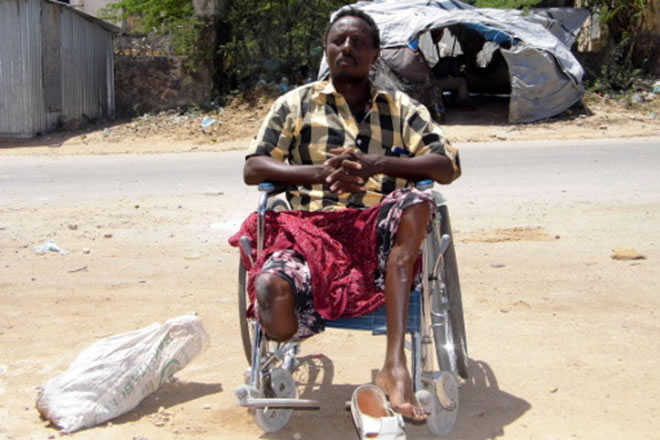
Dahir Mudey, 45, who lives in Mogadishu's Siyad Camp for internally displaced people, was severely injured in a landmine explosion in Bulo Burde district in Hiran region in 2007. [Osman Mohamud/Sabahi]

By Osman Mohamud
Friday, February 14, 2014
Mohamed Yahye, 56, who lost both legs in a mortar attack that hit his house during tribal clashes in Mogadishu in 1996, said disabled people have not receive the assistance they expected from the government after the security situation began to improve in Mogadishu.
"It looks as though the government and the public have forgotten about helping us as there is no group yet that has officially assumed responsibility for doing the things that are important for disabled people such as when we go to the ministries, police stations and the centre that issues national identification cards," he told Sabahi.
Yahye said people usually stand in long queues when they are applying for national identification cards, but it proves more difficult for people like him.
"There is no special place where the disabled people like me enter. They treat us like they treat the people who are not disabled, and it is an issue we are still waiting for the government to address," Yahye said.
Shamso Yusuf, a 38-year-old mother of five who lost both legs in 2012 when al-Shabaab attacked a wedding party at a house in Hodan district, told Sabahi she has not received any government help since that time.
"I have not received any care, and even the wheelchair that I use was donated to me by relatives who collected money for me," she said. "I have children whose father has died. I feel heartsick because I am not able to work like I used to when I was healthy."
Getting job training, raising awareness
Dahir Mudey, 45, an internally displaced person at Siyad Camp in Mogadishu, became disabled in 2007 after the car he was travelling in hit a landmine in Bulo Burde district in Hiran region. He lost one of his legs from the knee down and his other leg was severely injured. He has been confined to a wheelchair ever since.
"In other nations around the world, people like us get regular care and continuous monitoring of their situation, such as getting trained in job skills and receiving aid in the form of equipment to work with, but we are waiting for all that from our government," he told Sabahi.
Kamal Muse, 37, who studied business and administration at Kampala International University, was crippled by polio in one hand and leg when he was 5-years-old and is looking for work with the government.
"I sent several job applications to the ministries of the Somali government and I am now hopeful that I will get a job at the Ministry of Interior Affairs," he told Sabahi. "If I get the job, I hope to especially work towards securing the rights of disabled people because when a person finds a job working for the government, it is possible to get the freedom to speak up about what is of interest to him."
Aside from the general unemployment that exists in Somalia, Muse said it is more difficult for a disabled person to get a job.
"Disabled people like us do not have the presence we should have in businesses and the government because I think the public believes a disabled person would not be able to perform in the job if they are given work," he said. "But I have seen people whose limbs are intact yet disabled people work harder than them."
Muse said there were civil society organisations and diaspora Somalis who sometimes help disabled people, but it is not enough.
"What is more important than the assistance is improving the knowledge of disabled people, particularly by providing skills, and [raising awareness at] government ministries, the airport and police stations about welcoming disabled people in designated areas," he said.
Sabahi reached out on several occasions to Somali government spokesperson Ridwan Haji Abdiweli and the office of the Minister of Women and Human Rights Khadijo Mohamed Diriye to comment for this article, but those attempts were unsuccessful.
Giving disabled Somalis a voice
Abdullahi Hussein Osman, head of the Institute of Education for Disabled People in Somalia, a civil society organisation that has been working in Somalia since 1993, said he has not seen any tangible assistance from all the previous administrations and is waiting to see if the current government will include people with disabilities in its agenda.
"Somalis generally put all their efforts in politics, but there are no social welfare programmes that have been implemented in the country until now," he told Sabahi. Osman blamed the Somali government for not including disabled people when it consults various sectors of the public.
"I do not know what this current government will come up with, but I believe that it will also behave the same as the previous transitional government because when they were forming the government they conducted consultations with sections of the public and they never consulted us or asked us what our thoughts were," he said.
He said it would be difficult for disabled people to overcome their problems if the government does not come up with a plan to help them.
"We feel that we have been forgotten and there is no specific group at the moment that we can say has added us to their agenda to give services to the public, whether it is an international organisation or the Somali government…," Osman said.
One exception is the African Education Trust, which provided training for 115 disabled Somalis at four centres in 2012, he said. The disabled men and women were trained for a year on how to read and write, sew clothes, and do cosmetic work.
"The people who took advantage of those skills are all working today," he said.